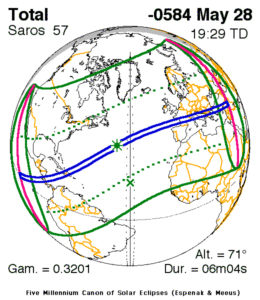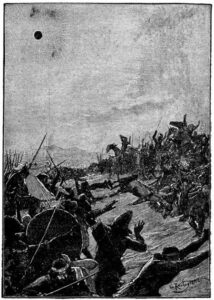 These days, we look forward to the eclipses that happen periodically with anticipation. People will even make travel plans to be at the best location to see the eclipse at its fullest coverage. This was not always the case, however. Eclipses of the distant past could even invoke fear among the people who witnessed them. Of course, in those days, they most likely didn’t know it was coming, or even what it was. On May 28, 585 BC such an eclipse occurred.
These days, we look forward to the eclipses that happen periodically with anticipation. People will even make travel plans to be at the best location to see the eclipse at its fullest coverage. This was not always the case, however. Eclipses of the distant past could even invoke fear among the people who witnessed them. Of course, in those days, they most likely didn’t know it was coming, or even what it was. On May 28, 585 BC such an eclipse occurred.
At the time of the eclipse, the Medians and Lydians were in the middle of a vicious battle. I’m sure they didn’t notice the eclipse at first, but as it became darker and darker, the situation had to seem very strange. Before long, they forgot about the vicious battle they were fighting and ran off the battlefield. “The Eclipse of Thales” was a solar eclipse that was, according to ancient Greek historian Herodotus,  actually predicted accurately by the Greek philosopher Thales of Miletus. In fact, it is probably the earliest recorded as being known in advance of its occurrence, and it is believed to be the solar eclipse of May 28, 585 BC. It is not known exactly how Thales predicted the eclipse, and some scholars don’t actually believe the eclipse was ever predicted at all. Others think it was on a different date, but the eclipse of May 585 BC best matches the conditions of visibility necessary to explain the historical event.
actually predicted accurately by the Greek philosopher Thales of Miletus. In fact, it is probably the earliest recorded as being known in advance of its occurrence, and it is believed to be the solar eclipse of May 28, 585 BC. It is not known exactly how Thales predicted the eclipse, and some scholars don’t actually believe the eclipse was ever predicted at all. Others think it was on a different date, but the eclipse of May 585 BC best matches the conditions of visibility necessary to explain the historical event.
According to Herodotus, the appearance of the eclipse was actually interpreted as an omen. It is believed to  have interrupted a battle in a long-standing war between the Medes and the Lydians. American writer Isaac Asimov described this battle as “the earliest historical event whose date is known with precision to the day.” The prediction has since been called “the birth of science.” According to historical records, that eclipse “peaked over the Atlantic Ocean at 37.9°N 46.2°W and the umbral path reached south-western Anatolia in the evening hours.” The Halys River, which is the presumed site of the battle mentioned by Herodotus, was just at the edge of the margin of error for the positioning of the eclipse. Herodotus’ The Histories 1.73–74 states that “a war started in that period between the Medes and the Lydians.” Apparently, the combatants became so distraught about the darkening conditions, that they actually ran off of the battlefield. Basically saying…”I’m outta here!!” That would be an interesting end to a battle, and it makes me wonder if they were later laughed at for their “cowardice in battle!!”
have interrupted a battle in a long-standing war between the Medes and the Lydians. American writer Isaac Asimov described this battle as “the earliest historical event whose date is known with precision to the day.” The prediction has since been called “the birth of science.” According to historical records, that eclipse “peaked over the Atlantic Ocean at 37.9°N 46.2°W and the umbral path reached south-western Anatolia in the evening hours.” The Halys River, which is the presumed site of the battle mentioned by Herodotus, was just at the edge of the margin of error for the positioning of the eclipse. Herodotus’ The Histories 1.73–74 states that “a war started in that period between the Medes and the Lydians.” Apparently, the combatants became so distraught about the darkening conditions, that they actually ran off of the battlefield. Basically saying…”I’m outta here!!” That would be an interesting end to a battle, and it makes me wonder if they were later laughed at for their “cowardice in battle!!”


Leave a Reply